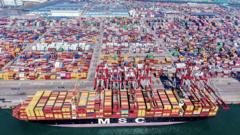Germans are preparing to vote in a significant snap election, driven by the collapse of Chancellor Olaf Scholz's coalition government. This election will not only shape Germany's future but also influence Europe's political landscape amid rising tensions with the Biden administration and concerns regarding migration.
Germans Head to the Polls: The Significance of Their Choice

Germans Head to the Polls: The Significance of Their Choice
The upcoming German election is pivotal as Europe reassesses its ties with the new U.S. administration under Trump while facing domestic political upheaval.
As Germany approaches its elections, voters find themselves at a critical juncture that could redefine the nation's political landscape. Scheduled for Sunday, the snap election arises after Chancellor Olaf Scholz's three-party coalition faced disarray, leading to its collapse last November. This departure from the anticipated election timeline is particularly relevant as Europe grapples with strong leadership needs and reassesses its alignment with the United States, especially under the Trump administration.
In recent months, the political climate in Germany has been characterized by voter dissatisfaction with mainstream parties, primarily the Social Democratic Party and the Greens. Presently leading the polls is Friedrich Merz from the conservative Christian Democratic Union. This party's resurgence indicates a shift in voter sentiment, spurred by mounting tensions surrounding migration policies and economic stagnation.
While Friedrich Merz appears poised for success, the hard-right Alternative for Germany (AfD) is gaining traction, predicted to secure its best election results to date. This reflects a broader trend observed across Europe, where right-wing parties have found increased support amid fears surrounding immigration and economic security.
The Social Democrats, who narrowly won the last election, are expected to finish in third place, facing potential historic lows as they reflect on their legacy and endurance. In stark contrast, the Greens may find themselves just behind in a rapidly shifting political environment.
With these variables at play, observers are keenly focused on how the results will shape not only the future of Germany but also its standing in a reconfigured European landscape. Will the election result in a stable government that can navigate the challenges ahead, or will it exacerbate existing divisions as the country continues to grapple with pressing issues both domestically and internationally? The outcomes remain uncertain, but their implications may resonate far beyond Germany's borders.






















